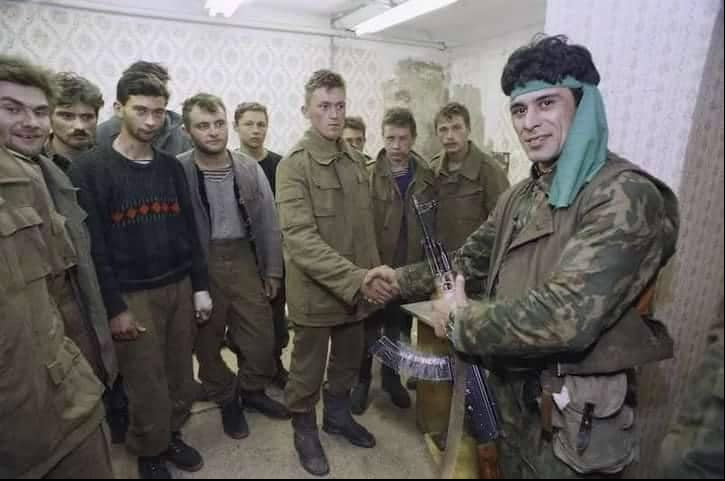The Russian leadership persistently, and for a long time, denied being involved in these events in eastern Ukraine, referring to the armed individuals in masks who disarmed Ukrainian military and police, and seized administrative buildings as “local militia”. Such false flag operations are nothing new, however, and should be considered an old Russian tradition. In the post-Soviet period, it was first tested in the Chechen Republic.
29 years ago, on the morning of November 26, 1994, tanks, armored vehicles, and forces of the so-called Chechen opposition entered the capital of the Chechen Republic. Almost immediately, Russia’s information space was filled with reports of the capture of administrative buildings, the dissolution of the government, and even the alleged escape from the city of the then-president, Dzhokhar Dudayev. By lunchtime, the sound of the news changed, and by evening, it had completely reversed. Media outlets published photos and videos of destroyed equipment, dead bodies, and crowds of captured coup makers, among whom, as it turned out, were dozens of officers from elite Russian military units. The “Chechen opposition”, it was revealed, did not have an entirely Chechen face. This caused confusion in Moscow’s political circles. The goal of the operation, which had been prepared secretly for many months, was to oust the Chechen leadership. Now the operation had turned into an embarrassing failure.
The next day, Russian and foreign journalists were given the opportunity to talk to the captured officers. They revealed that they had been recruited directly on the territory of the military units where they were serving. Officers from the Federal Security Service (analogous to the Soviet KGB) promised them substantial bonuses for a short “business trip” to the North Caucasus. The confidence that the Chechen government would fall with a single tank attack was so great that none in the Russian leadership bothered to come up with an explanation in case of failure. The Minister of Defense simply dismissed the captured soldiers, calling their accounts “nonsense”. According to him, they had been discharged from the Russian army a long time before, and the “trip” to the North Caucasus was by their personal initiative. A threat followed from Grozny: if Moscow did not recognize the captured officers as their own, they would be treated as mercenaries and possibly executed. It did not come to that, however. By the end of 1994, all of them were handed over to representatives of various Russian parties and political movements.
The November assault on Grozny became the finale in Russia’s hybrid war against Chechnya, which had begun following the republic’s declaration of independence in 1991. Locals, rallying around former Soviet and communist leaders for various reasons, became its backbone. The most pro-Russian sentiments were prevalent in the Nadterechny district – one of the fourteen administrative regions existing in the republic at that time. Opposition movements and parties established their headquarters in this area and later announced the creation of a Temporary Council – a body asserting a claim to power throughout the republic.
Opposition is a necessary element in the structure of any democratic society, provided that, in its pursuit of power, it relies on the ideas and the convictions of the population, rather than brute force. Especially not when the force comes from the outside. After the coup état of October 1993 – when Boris Yeltsin disbanded the Supreme Soviet in Moscow by military force and concentrated significantly more power in his hands than any president should have – he began to strengthen the Russian Federation. The new constitution, adopted at that time, included Chechnya as an integral part of the country. Calling the republic Russian was one thing, however. Bringing it back under Moscow’s jurisdiction was quite another.
The Russian leadership started financing and arming the self-proclaimed Temporary Council. The armed groups created under its auspices numbered no fewer than fifteen hundred people. Military equipment was transferred from Russian army warehouses as well. However, out of the 50 tanks provided to the opposition, only 12 managed to assemble Chechen crews; the rest were manned by active Russian officers. On November 26, 1994, the streets of Grozny were strewn with the corps of tanks and crew members alike. Only a small number of the individuals on this “business trip” managed to survive to face foreign and Russian journalists.
Any war is a mix of deceit, treachery, and cruelty. Russian hybrid operations like the November assault on Grozny also exhibit cowardice. Russian leaders were faced with the choice of either admitting their mistakes, thereby incurring reputational and political losses, or escalating the situation and securing themselves from potential accusations through widespread bloodshed. They opted for the latter, thus serving their own interests rather than those of their country’s residents. On November 30, 1994, in a closed session of the Security Council of the Russian Federation, a plan to deploy regular army units to the Chechen Republic was approved. As a result, the cowardice of politicians unwilling to be held accountable for their errors turned into two wars in the North Caucasus, spanning more than twenty years and resulting in the deaths of tens of thousands of people.
This article is based on materials from human rights organizations, collected and organized in the electronic database of the Natalia Estemirova Documentation Center (NEDC).
Contact us
Employee
